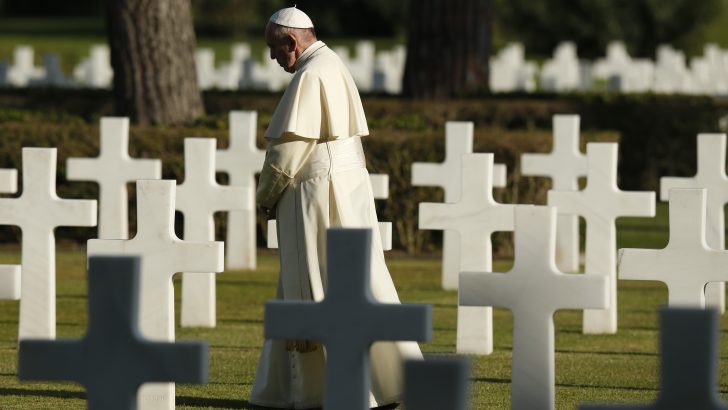Pope Francis’ visit to Egypt last week may have been one of the shortest overseas trips so far in his papacy, but it may prove one of his most important.
Friday morning saw the Pope arriving at Cairo airport and being officially welcomed to Egypt at the Heliopolis presidential palace, before joining the chief imam of Cairo’s Al-Azhar University, the academic heart of Sunni Islam, in addressing an international conference on peace hosted by the mosque.
Speaking at the conference in this, the seventh time he has visited a Muslim-majority nation, the Pontiff called the visit a journey of “unity and fraternity”, and called on Egypt’s religious leaders to expose violence masquerading as holy and condemn religiously-inspired hatred as an idolatrous caricature of God.
His call came against the backdrop of attacks on the country’s Coptic Christians that had killed 45 people.
Violence
Describing violence as “the negation of every authentic religious expression”, and accompanied by such religious leaders as Sheik Ahmad el-Tayeb, who had invited him to the conference, he continued: “As religious leaders, we are called, therefore, to unmask the violence that masquerades as purported sanctity and is based more on the ‘absolutising’ of selfishness than on authentic openness to the absolute.
“We have an obligation to denounce violations of human dignity and human rights, to expose attempts to justify every form of hatred in the name of religion and to condemn these attempts as idolatrous caricatures of God,” he continued, maintaining that God is holy and “the God of peace”.
He warned too not just against acts of violence in God’s name, but against attempts to fight fire with fire, saying “every unilateral action that does not promote constructive and shared processes is, in reality, a gift to the proponents of radicalism and violence”, instead urging people towards turning an “incivility of conflict” to a “civility of encounter”.
Afterwards, the Pontiff met with Pope Tawadros, the leader of Egypt’s approximately 272,000 Coptic Christians, where in a historic move toward greater Christian unity, the two leaders signed an agreement to end a longstanding disagreement over the Sacrament of Baptism.
Until then the Coptic Orthodox Church had required new members joining from most non-Coptic churches – including Catholics – to be baptised again, but the two leaders declared that they “seek sincerely not to repeat the baptism that has been administered in either of our Churches for any person who wishes to join the other”.
Afterwards, the two leaders prayed at the spot where dozens of Copts were killed by an ISIS militant last year, with Pope Francis saying that in the attack “the innocent blood of defenceless Christians was cruelly shed”, and that it was such innocent blood that has united them.
“Your sufferings are also our sufferings,” he said, continuing, “how many martyrs in this land, from the first centuries of Christianity, have lived their faith heroically to the end, shedding their blood rather than denying the Lord and yielding to the enticements of evil or merely to the temptation of repaying evil with evil?”
Pope Tawadros praised the Pontiff as a symbol of peace “in a world tormented by conflicts and wars”, and thanked him for following in the footsteps of his namesake, St Francis of Assisi, who visited Egypt to meet Sultan al-Kamel and engage in “one of the most important experiences of intercultural dialogue in history”, a dialogue, Pope Tawadros said, that Francis had renewed.
The following day saw the Holy Father celebrating an open-air Mass with 15,000 people in Cairo’s Air Defence Stadium, during which the Pope cautioned people against succumbing to despair by “refusing to believe that God’s omnipotence is not one of power and authority, but rather of love, forgiveness and life”.
The only kind of fanaticism acceptable to God is a fanaticism of charity, he said.


 Greg Daly
Greg Daly
